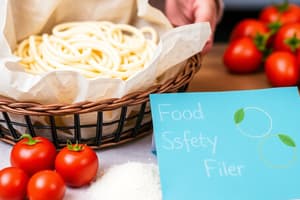Podcast
Questions and Answers
Was ist HACCP und welche Rolle spielt es in der Lebensmittelindustrie?
Was ist HACCP und welche Rolle spielt es in der Lebensmittelindustrie?
HACCP steht für Hazard Analysis and Critical Control Points und es hilft dabei, potenzielle Gefahren zu identifizieren, zu bewerten und zu kontrollieren, um die Lebensmittelsicherheit zu gewährleisten.
Was umfasst der Begriff Lebensmittelsicherheit und warum ist er wichtig?
Was umfasst der Begriff Lebensmittelsicherheit und warum ist er wichtig?
Lebensmittelsicherheit umfasst alle Aktivitäten und Praktiken, die darauf abzielen, Lebensmittelkontamination, Verderb oder Verfälschung zu verhindern. Sie ist wichtig, um sicherzustellen, dass Lebensmittel sicher und gesund sind.
Was bedeutet Rückverfolgbarkeit im Zusammenhang mit Lebensmitteln?
Was bedeutet Rückverfolgbarkeit im Zusammenhang mit Lebensmitteln?
Rückverfolgbarkeit bezieht sich auf die Fähigkeit, den Weg eines Lebensmittels von der Produktion bis zum Verkauf zurückzuverfolgen. Dies ermöglicht es, im Falle von Problemen schnell reagieren zu können.
Warum sind Zertifizierungen in der Lebensmittelindustrie wichtig und welche Rolle spielen sie?
Warum sind Zertifizierungen in der Lebensmittelindustrie wichtig und welche Rolle spielen sie?
Welche Bedeutung haben Hygienestandards für die Lebensmittelindustrie?
Welche Bedeutung haben Hygienestandards für die Lebensmittelindustrie?
Was versteht man unter Rückverfolgbarkeit in der Lebensmittelindustrie?
Was versteht man unter Rückverfolgbarkeit in der Lebensmittelindustrie?
Was sind einige Beispiele für Zertifizierungen in der Lebensmittelindustrie?
Was sind einige Beispiele für Zertifizierungen in der Lebensmittelindustrie?
Welche Rolle spielen Hygienestandards in der Lebensmittelindustrie?
Welche Rolle spielen Hygienestandards in der Lebensmittelindustrie?
Was ist HACCP und warum ist es wichtig in der Lebensmittelindustrie?
Was ist HACCP und warum ist es wichtig in der Lebensmittelindustrie?
Welche Hauptziele verfolgt die Lebensmittelsicherheit in der Lebensmittelversorgungskette?
Welche Hauptziele verfolgt die Lebensmittelsicherheit in der Lebensmittelversorgungskette?
Warum ist es wichtig, als Verbraucher auf Zertifizierungen zu achten?
Warum ist es wichtig, als Verbraucher auf Zertifizierungen zu achten?
Was sind Nahrungsmittel-Sicherheitsstandards und warum sind sie wichtig für die Lebensmittelindustrie?
Was sind Nahrungsmittel-Sicherheitsstandards und warum sind sie wichtig für die Lebensmittelindustrie?
Welche Bereiche umfassen Nahrungsmittel-Sicherheitsstandards?
Welche Bereiche umfassen Nahrungsmittel-Sicherheitsstandards?
Warum ist die Einhaltung von rechtlichen Vorschriften wie der Verordnung (EG) Nr. 178/2002 wichtig in Bezug auf Nahrungsmittel-Sicherheitsstandards?
Warum ist die Einhaltung von rechtlichen Vorschriften wie der Verordnung (EG) Nr. 178/2002 wichtig in Bezug auf Nahrungsmittel-Sicherheitsstandards?
Was beinhaltet die Qualitätskontrolle in Bezug auf Lebensmittelprodukte?
Was beinhaltet die Qualitätskontrolle in Bezug auf Lebensmittelprodukte?
Warum ist die Risikobeurteilung im Lebensmittelbereich wichtig?
Warum ist die Risikobeurteilung im Lebensmittelbereich wichtig?
Was sind die verschiedenen Aspekte, die die Qualitätskontrolle in der Lebensmittelindustrie umfasst?
Was sind die verschiedenen Aspekte, die die Qualitätskontrolle in der Lebensmittelindustrie umfasst?
Welche Rolle spielen Lebensmittelberichte in Bezug auf die Qualitätskontrolle?
Welche Rolle spielen Lebensmittelberichte in Bezug auf die Qualitätskontrolle?
Was sind die Vorteile der Anwendung von Lebensmittelberichten?
Was sind die Vorteile der Anwendung von Lebensmittelberichten?
Warum ist die Überwachung der Produktionsprozesse ein wichtiger Aspekt der Qualitätskontrolle?
Warum ist die Überwachung der Produktionsprozesse ein wichtiger Aspekt der Qualitätskontrolle?
Was ist der Zweck der Qualitätsbewertung in der Lebensmittelindustrie?
Was ist der Zweck der Qualitätsbewertung in der Lebensmittelindustrie?
Flashcards are hidden until you start studying
Study Notes
Quality Assurance in Food: Focus on HACCP, Food Safety, Traceability, Certifications, and Hygiene Standards
Imagine biting into a juicy apple, only to find it bruised and mushy, instead of the crisp delight you expected. Or perhaps you've heard about a food recall because of contamination concerns, leaving you wondering about the safety of the food supply. Quality Assurance (QA) in the food industry is a vital component that ensures your meals are not only delicious but also safe and healthy. In this article, we'll explore the key aspects of QA, specifically focusing on HACCP, food safety, traceability, certifications, and hygiene standards.
HACCP (Hazard Analysis and Critical Control Points)
HACCP is a systematic approach to identifying, evaluating, and controlling hazards that could lead to food safety issues, such as contamination, spoilage, or physical hazards. By implementing HACCP principles, food businesses can establish critical control points and monitor critical limits that help prevent or eliminate potential hazards.
The HACCP system involves seven principles:
- Conduct a hazard analysis
- Determine critical control points
- Establish critical limits
- Monitor critical control points
- Establish corrective actions
- Verify the system
- Document and record procedures
Food Safety
Food safety encompasses all activities and practices that aim to prevent food contamination, spoilage, or adulteration. Food safety is a shared responsibility between all participants in the food supply chain—from farm to fork. The primary goal is to ensure that food is safe, wholesome, and free from any contamination that could cause harm to consumers.
Traceability
Traceability is the ability to track food through all stages of production, processing, and distribution. This allows for quick identification of food sources, especially in the event of a recall or contamination outbreak. Traceability is a critical component of the food safety system, as it allows for timely and accurate information about the origin and movement of food products.
Certifications
Certifications are voluntary standards that food companies may choose to follow to demonstrate their commitment to quality and safety. Some common certifications include:
- Global Food Safety Initiative (GFSI) recognized certifications (e.g., BRC, IFS, SQF)
- Organic certifications (e.g., USDA, EU, Japan Agricultural Standards)
- Kosher and Halal certifications
- ISO 22000: Food safety management systems
Hygiene Standards
Hygiene standards are guidelines for best practices in food handling, preparation, and storage. Adherence to hygiene standards helps prevent contamination and reduces the risk of foodborne illnesses. Key hygiene standards include:
- Good Manufacturing Practices (GMP)
- Good Hygiene Practices (GHP)
- Hazard Analysis and Critical Control Points (HACCP)
Conclusion
Quality Assurance in the food industry is a multifaceted endeavor that combines HACCP, food safety, traceability, certifications, and hygiene standards. By implementing these practices and guidelines, food businesses can help ensure the safety, quality, and integrity of their products, providing consumers with a reliable and healthy food supply.
As consumers, it's essential to understand the importance of food safety and quality, and to support food companies that prioritize these principles. Stay informed about food safety and quality initiatives, and always look for the certifications that indicate a food company's commitment to quality and safety.
Remember, a safe and healthy food supply is a shared responsibility, and by working together, we can all ensure that the food we eat is safe, nutritious, and delicious.
Studying That Suits You
Use AI to generate personalized quizzes and flashcards to suit your learning preferences.




